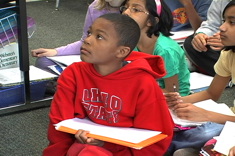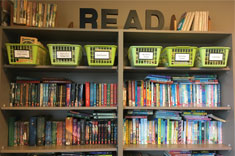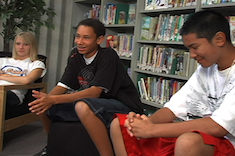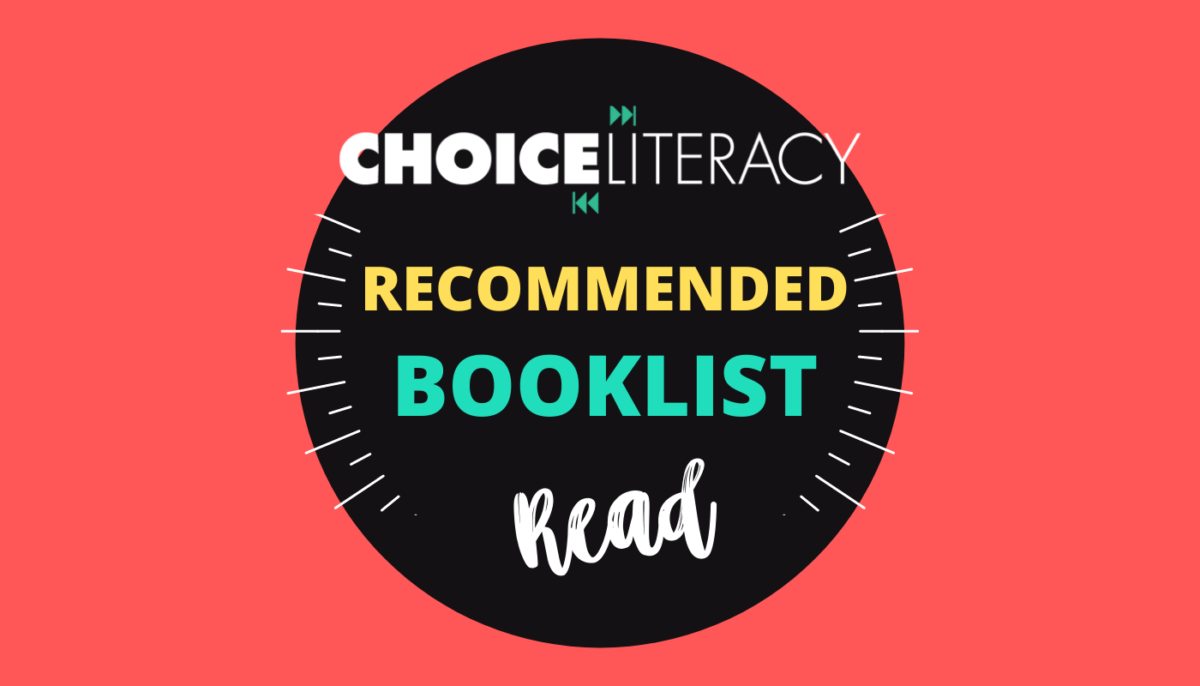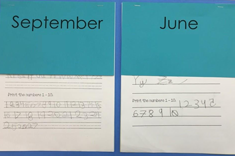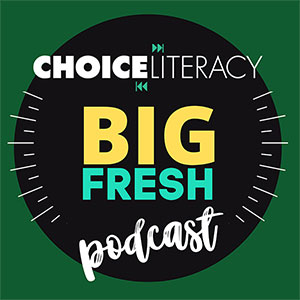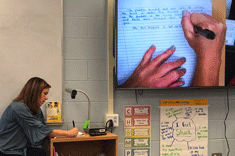Articles
Here is where you’ll find all the latest print features from our contributors. If you’d like to browse specifically by grade level, topic, or contributor, you can use the links in the right sidebar.
Latest Content
Overplayed Mentor Texts
Bitsy Parks outlines how to select mentor texts in order to have more ownership over the lesson and engage students.
Conventions and Keeping It Real
Melanie Quinn uses her fourth graders love of drama to create a fun activity for learning how to integrate quotations into writing.
Is Grammar-Check Cheating?
Gretchen Schroeder discusses grammar tools and the reasons students should use them as writers.
Creating Places for Dialogue
Leigh Anne Eck cracks open why dialogue is important in narrative writing and where to place dialogue in a story. She includes student samples that show the power of this craft move.
Transfer of Learning Podcast with Melanie Meehan
Melanie Meehan discusses the transfer of learning using pictures.
Crafting Argumentative Essays
Gretchen Schroeder shares a summative assessment inspired by Song Exploder in which her high school students craft an argumentative essay defending a choice of a great song.
Yoga Poses and Workshop Processes: Honor the Journey
Nawal Qarooni is inspired by her yoga practice to provide a guided reflection to consider if workshop practices are progressing to a transfer of learning.
How Pictures Can Engage and Inspire Writers
Melanie Meehan shows how pictures offer ways to expand access to students as writers by providing scaffolds and inspiration.
Writers’ Club
In her high school writing workshop, Julie Cox noticed that students wrote eagerly, but struggled to give and accept feedback. To increase student ownership and trust, she started Writers’ Club, and it affected transfer of learning in big ways!
Perspectives Podcast with Stella Villalba
Stella Villalba discusses the importance of perspectives.
Beyond Personal Narrative: A Change in Perspective
Cathy Mere nudges us to consider perspective as a craft move and provides a stack of mentor texts in this booklist.
Mother Language Day and Tradition Presentations
Bitsy Parks shares special events that help students widen their scope of acceptance and appreciation for the differences among us.
Finding the Purpose in Antiracist Literature Instruction
Gretchen Schroeder shares her failures in preparing for antiracist literature instruction, and the principles she uses to empower meaningful conversations about race.
Connections Podcast Brian Sepe
Brian Sepe discusses the importance of connections and mantras.
Finding a Way to Make Heterogeneous Grouping a Reality
Tammy Mulligan shares the vulnerable process of forming heterogeneous groups for book discussions.
Making Connections with Sociograms
Gretchen Schroeder taps into the connections between characters by creating sociograms with her high school students.
The Choice Literacy Book Club Discusses Neville by Norton Juster and G. Brian Karas
The Choice Literacy Book Club discusses Neville by Norton Juster and G. Brian Karas.
What’s the Most Beautiful Thing You Know About . . . ?
Ruth Shagoury and Melanie Quinn asked their colleagues to share the “most beautiful thing” about the puzzling student each of them is looking at closely in their study group. This is a great activity if you’re looking for a quick and easy icebreaker to spark some positive energy in your next study group or staff meeting and to remind everyone of the joys of our profession.
End-of-Year Reflections Podcast with Leigh Anne Eck
Leigh Anne Eck provides a guide to customize an end-of-year reflection for students.
From Seed to Blossom
Leigh Anne Eck provides a guide to developing an End-of-Year Reflection for students to consider their own growth, as well as offer advice regarding curriculum and instruction.
A Complete Circle: Identity, Growth, and Community
Bitsy Parks offers key end-of-the year activities that allow students to reflect and notice their identities, growth, and community as readers and writers.
Words of Wisdom and Passing the Torch
Melanie Quinn shares a fun activity to help current students share advice for next year’s class.
Hidden Treasures II Podcast with Jen Schwanke
Jen Schwanke shares insights about leading a school with hope and grace during COVID.
Student-Centered Learning Through Video Lessons
Tara Barnett and Kate Mills consider the power of asynchronous lessons in creating a student-centered learning environment.
Online Writing Notebooks
Gretchen Schroeder makes the leap to digital notebooks and finds new life in a tried-and-true practice.
Hidden Treasures Podcast with Dana Murphy
Dana Murphy candidly discusses keeping a positive mindset and approaching her students with an abundance of grace.
COVID Silver Linings: Positive Changes in Teaching Practices
Dana Murphy outlines the teaching practices that she learned from remote teaching and plans to carry with her upon returning to a physical classroom.
A Minimalist Classroom
Mandy Robek adjusts her mindset of preparing her classroom according to COVID guidelines and discovers an open heart and mind as she prepares a “minimalist classroom.”
The Choice Literacy Book Club Discusses Little Brown by Marla Frazee
The Choice Literacy Book Club discusses Little Brown by Marla Frazee.
Word Work Podcast with Mandy Robek
Mandy Robek discusses word work on the podcast.
Browse Content By
Type
Category
- Assessment Tools
- Big Fresh Archives
- Booklists
- Choice Numeracy
- Classroom Design
- Common Core
- Community Building
- Conferring
- Content Literacy
- Digital Literacy
- English Language Learners
- Equity
- Family Relations
- Free Samples
- Guiding Groups
- Leadership
- Literacy Coaches
- Mentor Texts
- Minilessons
- New Teacher Mentors
- Podcasts
- Poetry
- Quote Collections
- Reading Strategies
- Self Care
- Struggling and Striving Learners
- Talking and Listening
- Teacher Study Groups
- Teaching Reading
- Teaching Writing
- Word Study and Vocabulary
Author
- Melissa Quimby
- Nawal Qarooni
- Gwen Blumberg
- Julie Cox
- The Lead Learners
- Hannah Tills
- Josie Stewart
- Ruth Metcalfe
- Mallory Messenger
- Becca Burk
- Jodie Bailey
- Vivian Chen
- Mary Brower
- Tiffany Abbott Fuller
- Stephanie Affinito
- Ruth Ayres
- Leigh Anne Eck
- Heather Fisher
- Shari Frost
- Julie Johnson
- Suzy Kaback
- Gigi McAllister
- Shirl McPhillips
- Melanie Meehan
- Cathy Mere
- Debbie Miller
- Tara Barnett and Kate Mills
- Tammy Mulligan
- Dana Murphy
- Bitsy Parks
- David Pittman
- Brenda Power
- Heather Rader
- Matt Renwick
- Mandy Robek
- Christy Rush-Levine
- Gretchen Schroeder
- Jen Schwanke
- Brian Sepe
- Katherine Sokolowski
- Stella Villalba
- Jennifer Vincent
Grade Level
Choice Literacy Membership
Articles
Get full access to all Choice Literacy article content
Videos
Get full access to all Choice Literacy video content
Courses
Access Choice Literacy course curriculum and training


